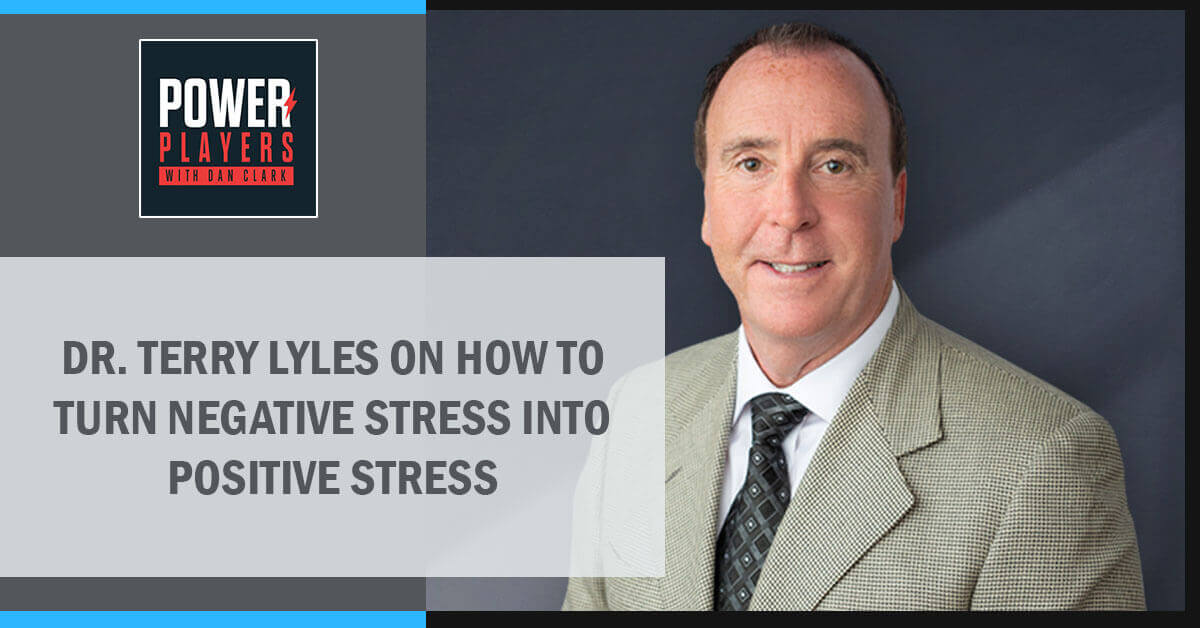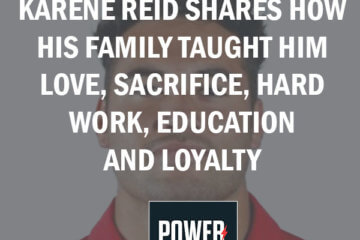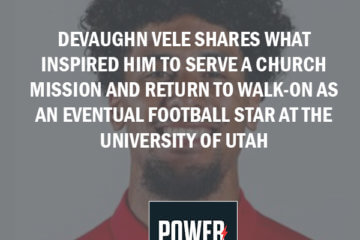Listen to the Podcast Here

Stress affects everyone, whether you’re a part of the workforce or not. But stress without passion and inspiration is just negative stress. Learn how to turn that around and transform it into something positive. Join Dan Clark and his guest, stress coach Dr. Terry Lyles, as they dive into how you can find that passion. Dr. Lyles talks about his work focused on teaching people how to navigate life storms and difficult situations through stress utilization and work-life balance training. Start winning in high-stress situations by tuning in today.
—
Dr. Terry Lyles On How To Turn Negative Stress Into Positive Stress
This is an interview with the world’s foremost expert on stress management, Dr. Terry Lyles. Thanks for spending some time with me. In this episode, my colleague, Dr. Terry Lyles, with PhD in Psychology, an expert in Bio and Psychotelemetry, educator, best-selling author, speaker, stress coach, shares his work focused on teaching groups of all ages how to navigate life’s storms in difficult situations through stress utilization and work-life balance training.
You have seen him on Good Morning America, The Today Show, CNN, Fox, and he is featured in major publications as the go-to guy to help us deal with stress, to turn negative stress into positive improvement. In this fascinating interview, Dr. Lyles gives us an inside glimpse into his lifelong dedication to maximizing performance under pressure.
—
I have read your book. I love how Dr. Lyles points out that stress in a corporate environment and world of work we call stress. Yet, in sports, we call it a competition. Let’s dive right into the discussion. Dr. Lyles, thank you so much for joining this program.
Thank you, Dan. I am excited to be here with you. I have been looking forward to this day. I am excited to meet your readers and followers. I hope we can have a great conversation and make some sense out of what is going on in the world.
Let’s dive right into your definition of stress.
It is energy expenditure. We expend the energy mentally, emotionally, spiritually, and physically as I teach. Those are four wheels on the same car. You can’t send your mind to work now that no one is going to work and leave your body at home and vice versa. We all go together as a package. As I commonly tell performers, it only takes one flat to have a bad day with your car. You do not need four flats. If you can have a bad day mentally, you got a problem. If you can have a bad day emotionally, spiritually, and physically, you got a tow truck coming. It is all about how do you navigate those four capacities to find the alignment, to get the best out of your daily performance and yourself?
Let me throw out three scenarios and then you could add your taken definition. On September 11, 2001, when the terrorist blew jets on to the World Trade Center, Pentagon, while most people were running out of the burning building, screaming, our first responders, military personnel, and a few bridge citizens were running into the buildings. Why did they handle this stress differently and rise to the occasion as power players?
It only takes one flat to have a bad day with your car. You don’t need four flats.
Training because it equips us to understand that danger is only a deficit, not quite understood yet, but the training prepares us to go into harm’s way versus running away. We that have that train believe we can make a difference with what we know and how we can do it. I spent three months at ground zero after that. It is interesting you mentioned that. That sixteen square blocks became a home for us as responders, digging bodies out, coaching, counseling, and crying with people.
One of my clients was Morgan Stanley, who had 3,800 people in the North Tower when it went down. I was supposed to be there two days after 9/11 on a plane going there. We do this by training. People that run away, it is not that they’re afraid or weak. It is just that they do not have the training equipment. These podcasts, training, books, seminars, and things that we do to educate people are training to help people understand that fight or flight psychologically is differentiated by our training, those who run into harm’s way and run away to protect themselves.
I know you work with elite high-performance athletes. In the second scenario, how would you train a race car driver who needs to push him or herself to the limit and go fast enough to win?
The same thing. It is training. My IndyCar driver, Oliver Askew, won the IndyCar Lights Championship and went on to a full-time IndyCar ride, starting out 2019, but it is all paused like everything else in the world. He is 21 years old. He has already won his first championship, and his career is now starting. The issue with those drivers is not just performing. It is not about life and death. It is about winning.
Winning is an attitude and a thought process. That is where the preparation comes in. How do you train your mind and body to handle pressure and stress at 230 miles an hour with 33 other maniacs, all with road rage? You go out there and do what you are trained to do because you love it. You love what you do. When you love what you do, the wall, speed, and gravity is not the issue because you are going to have a blast doing it. It is a mindset.
I have one last scenario, which brings us into the first P of the three Ps, Passion, Preparation, and Pursuit. In passion, your reason is your love of the game. I know you work with Olympic athletes, who believe of the motto, “Citius, Altius, Fortius,” faster, higher, stronger. These Olympic athletes believe world records are meant to be broken. They continuously push themselves to their ultimate capacity but just so are human beings. Some would say, “I can’t take the stress. I can’t handle it. This is not going my way.” These folks create stress. How do you teach them? What does that training about?
Athletes do not use the word stress like we do in the corporate world. They call it a competition. Competition for any performer or elite athlete is fuel. It fires you up. It is what drives you. Here is what I say about fuel. I can take fuel, pour it on the floor, light it, and I have got another control fire. I can take that same fuel, put it in my car, and it controls the environment called a gas tank.

Negative Into Positive Stress: Stress is energy expenditure. You expend the energy mentally, emotionally, spiritually, and physically. You can’t send your mind to work and leave your body at home, and vice versa. It all goes together.
Those through the gas lines, through the fuel injectors, fire my engine up is controlled combustion or force. It is all about containment. When you can contain your passion to not just flash out of you but contain it to empower you, that is where elite performers understand that their passion is wrapped up in competition, not in the threat or bad stress scenario that most of us see in the corporate world.
The first P is Passion. What part does finding our passion play in dealing with stress then, and more specifically, when and how did you first identify your passion so that you knew that it was one of those secret ingredients to dealing with stress?
First of all, passion is fueled. It is necessary for anything that we do. There are four things I like to hammer through when I do training and speaking ratings. It is passion, perseverance, and force, which is big, but then motivation is one of those. All four of those things are driven by inspiration. Passion is one of the four cylinders that is driven by inspiration. At a young age, I began to realize that I had aspirations to do things and impact the world. My mom and dad were good old country people and worked in factory jobs. There were six of us in our 800-square-foot house. I was not college material. I did not do that, and I said, “I have to.”
There was something in it inside of me that burned. That is the passion to me. When that passion began to inspire me, I realized that I needed to be educated, get myself out into the world, go pursue and travel. It is the alignment of passion that makes the difference, but if it comes from inspiration. I loved the old Hebrew word mashima. It is what inspiration is. It means to breathe and/or inspire. When I am breathing in, my lungs are inspired by oxygen and my blood cells to live.
When I breathe in life from you on this show, it inspires me because I know we are talking to people and I can touch their lives. That is inspirational to me. It goes back and forth. Like oxygen in a room, we need it to live. It is powerful. That is what inspired me. Knowing, first of all, I needed to make a difference in the world, but yet I needed to go get prepared, not just be ready to impact the world because everybody is ready, but not everybody’s prepared. I would be prepared to meet that call.
This is about power players. My readers want to know the secret sauce or the pixie dust. There is no one better qualified to teach this. What could we specifically do to prepare ourselves and tap into our passion so we can better turn stress into competition and personal development?
This is going to first sound crazy, probably, if no one has ever heard me talk or discuss this concept. It is literally grabbing your deepest darkness, secrets, and pains. Healing from those and, at the same time, converting those into your greatest opportunity. I have a 35-year-old special needs son who has never spoken and never walked. He is in a wheelchair, still fed and diapered as an infant. He is at my house.
Athletes don’t use the word stress as people in the corporate world do. They call it competition.
As we speak, I am doing my three-day stint with him at night. He does not sleep at night, rolling and casting. It is an ongoing three-and-a-half-decade journey of chaos and confusion. In the midst of that, I learned that his brokenness became my greatest opportunity to succeed. I grew up in Indianapolis by the Motor Speedway. IndyCar racing specifically was my love. I have trained 40 drivers in my career.
I got the backseat ride with Dr. Terry Lyles. We are going 200 miles an hour and a wall that I did not think we were going to make a turn on.
That was turn one. It is scary. I met Roger Penske through Emerson Fittipaldi, which was one of his chief drivers at that time, in 1991, who won Indy 500 because of my special needs son. He came off the stand signing autographs, which I went to go get with my family. He got up and moved down, came to my special needs son, knelt down in front of him in his wheelchair, and said, “Be my guest at the race this weekend.” I was blown away. I am like, “Are you kidding me?”
You do not have to be good. You need to be prepared and put yourself in harm’s way to interact with your destiny. I first met Roger Penske that weekend in Detroit. It has been lights out since then. I still do work for them and train their drivers. You have to think beyond what is right with you and focus on what’s wrong with you. Embrace it, deal with it and move through it. Not around it. Do not deny it. That is a hard lesson to learn for all of us. It is still hard for me. I am still learning.
It is exciting to listen to gurus like you because you do not remember the facts and figures. We remember the interpretation of the facts and figures. You reminded me of my sweet dad. He battled cancer for six and a half years. About two months before he passed away, we gathered our entire family together. He said, “What are all of you learning from this?” It turned the tables. I relate to what you were talking about with your beautiful son. My oldest daughter teaches special needs at a middle school with children who are severely challenged.
Let me ask you a personal question. You are the guru. You and I both know that the secret of being an amazing speaker is to be the same offstage as we are on stage. You have that reputation. We all love and admire you so much, but I want to know if you can be vulnerable. Did you ever fail at something? What did you specifically do about it? I laugh as a motivational speaker in the home. I’ll say something and my children will turn my philosophy back in my face to make sure that I am talking the talk and walking the walk. What is one specific experience where you failed and then taught us what you did about it that illuminated even more information for you to help other people?
That is a deep question because I have failed a lot in my life. I have got a lot of failures. The one that popped into my head that scared me when you said that was I had been hired and retained by Ray Evernham, a NASCAR team owner at that time. He is now a Hall of Fame chief. He had won all the championships with Jeff Gordon.

Negative Into Positive Stress: When dealing with stress, you need to find passion, perseverance, force, and motivation. All four of those things are driven by inspiration.
He had brought me on to Dodge Motorsport to coach and train their drivers and 450 employees, the whole thing. About a week or so into that, I had an agency that was putting me out there, promoting books, and different things. They had put out a press release that said I was going to be at the Charlotte Motor Speedway that particular weekend to do interviews for people that wanted to know what I was coaching the drivers on.
Ray calls me and says, “You can’t do that.” I go, “Do what?” I did not even know she did it. He goes, “You cannot talk about what you talked to our drivers about.” I am like, “Of course not. I am a shrink by train. I do not do that.” He goes, “The press release went out from your people. I have to sever our relationship before it starts.” I hung up the phone. I am in Miami airport flying to Charlotte for the race that weekend devastated. I am like, “Are you kidding me? How does this happen?” I let a couple of weeks go by and I text Ray. I said, “Call me when you get a chance. I still want to talk to you and work with you.”
He finally called me back. I convinced him. That was real. I fired that publicist. I had no idea that press release went out. He gave me another opportunity. We won championships. We won races. I did four years with them. It became Richard Petty Motorsports. The thing continued. The scariest moment in my racing career for NASCAR was that I was fired before I even started with something I did not even do, but because I was patient and I kept communicating, we were able to bring that back and we all won. At the end of our days, when you think you are failing, you are only falling. Know that you got a parachute. Pull the ripcord before you hit the ground.
You never lose it. You always learn. You always remind me when I listened to you on TV and in this interview of one of my favorite quotes, “Pain is a signal to grow, not to suffer.” Once we learn the lesson, the pain is teaching us. The pain goes away. In life, there are no mistakes, only lessons. I appreciate the lessons you are teaching us. The last P is the pursuit of that passion. To conclude our time together, I want to refer to professor Randy Pausch who coined the speech title Last Lecture.
I want to put you on the hot seat if I can and ask you if you had one day to live with all of your experience in so many different fields, world-class athletes, racecar drivers, and the horrific events that happened on September 11th, 2001 when we go through traumatic experiences, what is your one consolidated message to the world that would help all of us become a power player? The ingredients to being a power player transcend all generations, races, genders, and socioeconomic conditions. What works for one of us will work for all of us if it is true and you speak total truth.
Always remember that it is not about. As Walt Disney said, “This whole thing started with a mouse.” Keep it simple. Your and my consolidated successes are mere shadows of the past or judged by what we do now. My faith in God, my love for my family, and my pursuit for excellence every day that I wake up and I do the same things within reason every single day to make a difference that if I died now, I would die giving an interview to your show, speaking to your readers that said, I gave everything to you that you asked me and that I gave it with everything within me.
Never quit. Never give up. Always believe but know that failures are real. Success is earned. It is hard work. You have got to get up and do it again. When I roll my son at night in the sleep, 4, 5, 6, or 7 times a night, I change him at his night. He is having seizures. I relax him. I try to hold and comfort him. I go back to bed. I wake up in the morning and I know I am alive. My final piece is, do not just live now. Be alive as you are living and live it like your last day. That is living with no regrets.
When you think you’re failing, you’re only falling. Know that you got a parachute. Just pull the ripcord before you hit the ground.
There you have it, Dr. Terry Lyles. How can we get ahold of you and join your tribe?
TerryLyles.com. We have a lot of free things on there that we give out to readers and subscribers. I have a downloadable piece on there called Caught In Nature’s Path, which is about this type of thing like Corona. It was not written for that, but it was written for disaster and what you do when disaster hits. This is a natural disaster that just happens to be a virus.
It is a free 30-page download there. It is a PDF. Download it and give it to others. I also have a ten video series we did on the stress of working from home during Coronavirus. Those are interesting little video clips and vignettes about dealing with your spouses, kids, and homeschooling. I appreciate anybody that goes there.
Share it with others. We have many giveaways there that we want to empower our communities on how to be better and how to be whole. Performance under Pressure book is there, and all the rest are giveaways. I am excited to be a part of moving through this whole scenario of whatever the psychological reset is going to be. Because of this Coronavirus, we are going to come out looking differently, yet on top when this thing is over.
Years from now, this interview will still be relevant because what you reminded the world in the snapshot is crisis does not make or break a man or woman. It reveals the true character within. I appreciate this time so much. I look forward to hanging out with you.
Thank you. I appreciate what you do.
Remember, when you finally decide to be a power player, your power play begins with you. Until next time. As Dr. Terry Lyles reminded us, quantify your takeaway and go make a power play. You’ll have a good one.
Important Links
- Dr. Terry Lyles
- Morgan Stanley
- Oliver Askew
- Ray Evernham
- Randy Pausch Last Lecture: Achieving Your Childhood Dreams – YouTube
- Caught In Nature’s Path
- Performance under Pressure
About Dr. Terry Lyles
 Dr. Terry Lyles holds a Ph.D. in psychology and is recognized as a national/international educator, author and speaker to universities, schools, Fortune 500 Companies, world-class athletes, and public audiences. He teaches groups of all ages how to Navigate Life Storms through life balance training.
Dr. Terry Lyles holds a Ph.D. in psychology and is recognized as a national/international educator, author and speaker to universities, schools, Fortune 500 Companies, world-class athletes, and public audiences. He teaches groups of all ages how to Navigate Life Storms through life balance training.
Dr. Lyles has trained hundreds of individuals including Fire Rescue workers in and around Ground Zero, International Forensic Medical teams in the Asian torn Tsunami area and the United States Air Force Space Command, sharing his time-tested, scientifically measured approach to stress utilization. Major corporations have also benefited from this training technology such as DaimlerChrysler, Banana Republic, Macy’s West, Pfizer, Universal Studios and Tommy Hilfiger, to name just a few.
Dr. Lyles has appeared on NBC, ABC, USA Today, CNN, Headlines News, The Big Idea with Donny Deutsch and FOX NEWS, and in U.S. News & World Report as a Corporate Performance Enhancement and Life-Balance Specialist, and hosted a premiere talk show sponsored by Success Magazine, and was heard as the “Stress Doctor” in South Florida.


